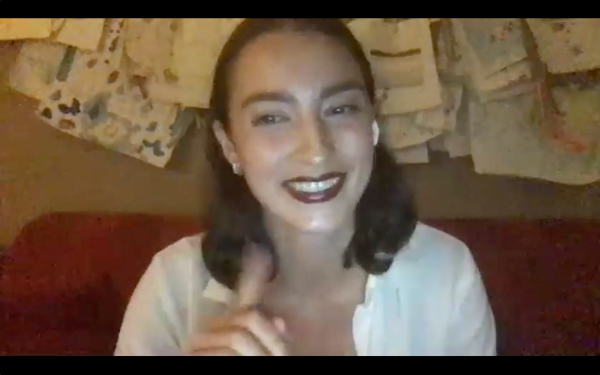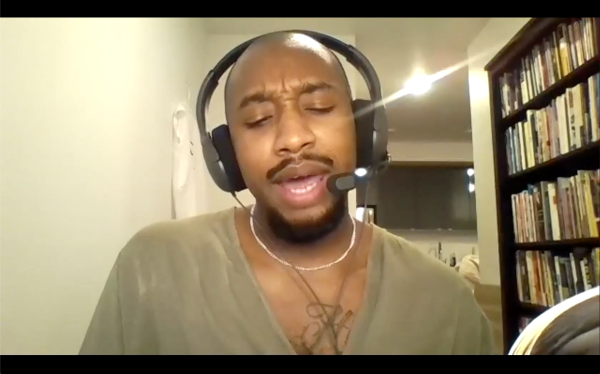A Celebration of All Things Verse
Review of Spotlight Poetry livestreamed by the Hugo House
Written by Teen Writer Bayla Cohen-Knott and edited by Teen Editor Mila Borowski

It just wasn’t fitting for such an event to end with the Zoom window closing. More fitting would have been a standing ovation before reflecting in a dim lobby while eating scones. Instead, I closed my laptop, left alone to contemplate the words of visiting poets Tess Taylor and Julia Guez, who joined the three hosts of The Poet Salon podcast, Gabrielle Bates, Luther Hughes, and Dujie Tahat. The event was described on the Hugo House website as “a celebration of all things verse.” It truly lived up to that.
Gabrielle Bates, who started, showed us the immersive side of verse. She admitted to us that she was quite nervous, as it was her first virtual reading. Often I assume that professional writers are comfortable with vulnerability, so I appreciated her candor. Bates’ openness set the stage for a genuine atmosphere where she delved into spooky fall feels. The first poem she read was entitled “How Judas Died.” Her voice softened and she won us over with her haunting imagery. She continued with “Conversation with Mary,” where she tells us of a nightmare in which she was impregnated by God. Her language was so certain, I was itching to have the lines in front of me to re-read and explore. During her reading of her poem “Pre-Elegy for Dad,” in response to the line “He is my mother,” the Zoom chat was flooded with awed remarks. She finished with “The Mentor.” My favorite line from this poem was “keeping language close to my mouth,” which evoked thoughts of a certain tug-of-war between speaking and voice. Her surreal images and thought-provoking lines threw me right into the deep end, where I would stay for the entire evening.

Next was Julia Guez, who started with a series of short poems. Each word seemed to bounce off the ones next to it. In “Nocturne,” the lines prodded along, one step forward, two steps back, and her voice hummed with rhythm. Two lines from her other works were particularly clever; “have a saltine, this is to say I understand” and “leave the lily alone and gild the finger.” One of her more recent poems was entitled “Still Life with Insufficient Icloud Storage.” She explained how she began this summer to mourn “the violence we were sending up into [technology].” Her response was to say, “let’s write through this.” Her thought provoking introduction made what was a less stunning work still intriguing. She finished by reading a poem that read as a response to the murder of George Floyd. With lines such as, “my neck hurts” and “I can’t breathe,” written in the first person from a non-black person, I questioned what was okay to say in the name of impact and art. This ended her time on a solemn note.
As soon as Luther Hughes’ video was spotlighted, he began to read in a smooth voice; at times he would even sing. During his opening poem, upon reading the line “at the end of the day, agony is a mouth,” the chat bubbled with comments of appreciation. This poem was from his chapbook Touched, a collection through which he dances around the body. He read one more delightful poem from Touched, before moving on to his forthcoming book A Shiver in the Leaves. I wanted his words to keep flowing and never stop. His wording is captured in the following lines from his poem “In Seattle”: “I walk through an alleyway of saliva, sour with smiles,” and “a friend texts me the news, he has killed me again, art in its truest form, repeats.” He sipped his wine casually as if people in the chat didn’t say they died from the beauty of his poems. He read two more poems, resulting in an intense yet tender end that summed up his reading well.

Dujie Tahat went next. The first poem, “I Take My Kids to School and the President is Set to be Acquitted,” strung together events from the past year to be personally reckoned with. They then explained that they like to set constraints on themselves in their writing. They use the form of Balikbayan, a thirteen line poem in the shape of a box three inches wide. This form has a significance for Filipino expats, (Tahat is Filipino-Jordinian themself), being the thing one would send home. A few stand-out lines from their Balikbayan poems were, “the world is so strange until I remember that I’ll die and then it’s beautiful,” “wrinkle, go to seed,” and, “I will die, and what I would give to unknow that you will too.” These lines touch on a common theme in Tahat’s works: the cycle of life and death. “Every Balikbayan is in Some Way or Another for my Mother” was Tahat’s last poem, connecting again to the both personal and universal themes that made their poems so emotional to hear.
We finished with Tess Taylor, who deviated from her set list after hearing Bates’ October poems and read some of her cultural ghost poems instead. She started with “Graveyard Monticello,” the poem of Thomas Jefferson. She enunciated her words, having chosen them carefully. Her book Rift Zone, she explained, is for the West, the town she grew up in, and the ghosts that are here. She read a quote from the beginning: “in the rift between what is going to happen, and whatever we wish to happen, poetry holds attention for a space.” I see this as an attention to imagination but also to what is real, what is happening, and what is important. Taylor's poems reckon with history and fact and turn them into metaphor. She ends with a lullaby, and reads, “tonight I rock you out of bodily memory.”
Bates’ imagery, Guez’s rhythm, Hughes’s emotions, Tahat’s impact, and Taylor’s history celebrated the power of poetry. Find Spotlight Poetry recorded on the Hugo House Facebook page. Sit back, listen, and immerse yourself in their voices.
Spotlight Poetry streamed via the Hugo House on October 7, 2020. For more information see here.
Lead photo credit: Opening screen with featuring the writers of Spotlight Poetry. Photo courtesy of Hugo House.
The TeenTix Newsroom is a group of teen writers led by the Teen Editorial Staff. For each review, Newsroom writers work individually with a teen editor to polish their writing for publication. The Teen Editorial Staff is made up of 6 teens who curate the review portion of the TeenTix blog. More information about the Teen Editorial Staff can be found HERE.
The TeenTix Press Corps promotes critical thinking, communication, and information literacy through criticism and journalism practice for teens. For more information about the Press Corps program see HERE.

